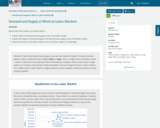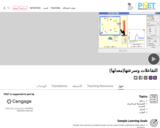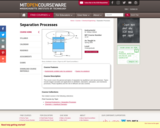
36 Results


By the end of this section, you will be able to:
Contrast consumer surplus, producer surplus, and social surplus
Explain why price floors and price ceilings can be inefficient
Analyze demand and supply as a social adjustment mechanism
- Material Type:
- Module
- Author:
- OER Librarian
- Date Added:
- 08/12/2021

By the end of this section, you will be able to:
Explain demand, quantity demanded, and the law of demand
Identify a demand curve and a supply curve
Explain supply, quantity supplied, and the law of supply
Explain equilibrium, equilibrium price, and equilibrium quantity
- Material Type:
- Module
- Author:
- OER Librarian
- Date Added:
- 08/12/2021


By the end of this section, you will be able to:
Explain protectionism and its three main forms
Analyze protectionism through concepts of demand and supply, noting its effects on equilibrium
Calculate the effects of trade barriers
- Material Type:
- Module
- Author:
- OER Librarian
- Date Added:
- 08/12/2021


By the end of this section, you will be able to:
Predict shifts in the demand and supply curves of the labor market
Explain the impact of new technology on the demand and supply curves of the labor market
Explain price floors in the labor market such as minimum wage or a living wage
- Material Type:
- Module
- Author:
- OER Librarian
- Date Added:
- 08/12/2021

Explore what makes a reaction happen by colliding atoms and molecules. Design experiments with different reactions, concentrations, and temperatures. When are reactions reversible? What affects the rate of a reaction?
- Subject:
- Chemistry
- Physical Science
- Material Type:
- Simulation
- Provider:
- University of Colorado Boulder
- Provider Set:
- PhET Interactive Simulations
- Author:
- Kathy Perkins
- Linda Koch
- Mindy Gratny
- Ron LeMaster
- Trish Loeblein
- Date Added:
- 11/15/2007

Explore what makes a reaction happen by colliding atoms and molecules. Design experiments with different reactions, concentrations, and temperatures. When are reactions reversible? What affects the rate of a reaction?
- Subject:
- Chemistry
- Physical Science
- Material Type:
- Simulation
- Provider:
- University of Colorado Boulder
- Provider Set:
- PhET Interactive Simulations
- Author:
- Kathy Perkins
- Linda Koch
- Mindy Gratny
- Patricia Loblein
- Ron LeMaster
- Date Added:
- 12/02/2010

Oxidation and reduction reactions power your phone and make it possible for your body to use the oxygen you inhale. We will learn about oxidation states (numbers), oxidation-reduction (redox) reactions, galvanic/voltaic cells, electrolytic cells, cell potentials, and how electrochemistry is related to thermodynamics and equilibrium.
- Subject:
- Chemistry
- Physical Science
- Material Type:
- Lesson
- Provider:
- Khan Academy
- Provider Set:
- Khan Academy
- Date Added:
- 08/13/2020

General principles of separation by equilibrium and rate processes. Staged cascades. Applications to distillation, absorption, adsorption, and membrane processes. Phase equilibria and role of diffusion. 10.32 will be offered for 6 units starting spring 2004.
- Subject:
- Biology
- Life Science
- Material Type:
- Full Course
- Provider:
- MIT
- Provider Set:
- MIT OpenCourseWare
- Author:
- Dalzell, William
- Date Added:
- 01/01/2005

Statica is de leer van mechanisch evenwicht.
Een lichaam beweegt niet (of is in een éénparige rechtlijnige beweging) als de som van de krachten die op dat lichaam werken nul is. Als ook de som van de momenten die op dat lichaam werken nul is, dan roteert het lichaam ook niet.
De consequentie van deze twee evenwichtsvoorwaarden (som van krachten =0 en som van momenten =0), is dat voor een lichaam waarop een aantal bekende krachten werken de (onbekende) reactiekrachten bepaald kunnen worden .
Dit is van groot belang omdat de grootte van de reactiekrachten de dimensionering en materiaalkeuze van toe te passen componenten bepalen.
Binnen het vak “Statica” wordt in detail ingegaan op de verschillende mechanische belastingen, vaak voorkomende constructies en hoe te rekenen met de diverse belastingen.
- Subject:
- Engineering
- Physical Science
- Physics
- Material Type:
- Assessment
- Lecture
- Reading
- Provider:
- Delft University of Technology
- Provider Set:
- Delft University OpenCourseWare
- Author:
- Prof.dr. G.C.A.M. Janssen
- Date Added:
- 08/13/2020

This subject deals primarily with equilibrium properties of macroscopic systems, basic thermodynamics, chemical equilibrium of reactions in gas and solution phase, and rates of chemical reactions.
- Subject:
- Chemistry
- Physical Science
- Material Type:
- Full Course
- Provider:
- MIT
- Provider Set:
- MIT OpenCourseWare
- Author:
- Bawendi, Moungi
- Nelson, Keith
- Date Added:
- 01/01/2008

What is economics and why should you spend your time learning it? After all, there are other disciplines you could be studying, and other ways you could be spending your time. As the Bring it Home feature just mentioned, making choices is at the heart of what economists study, and your decision to take this course is as much an economic decision as anything else.
Economics is probably not what you think it is. It is not primarily about money or finance. It is not primarily about business. It is not mathematics. What is it then? It is both a subject area and a way of viewing the world.
- Subject:
- Economics
- Social and Behavioral Sciences
- Material Type:
- Textbook
- Provider:
- University of Hawaii
- Provider Set:
- Pressbooks
- Author:
- Cynthia Foreman
- Thomas Scheiding
- Date Added:
- 08/13/2020

